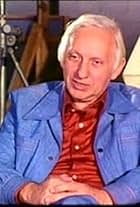Fred Freiberger(1915-2003)
- Writer
- Producer
- Additional Crew
Fred Freiberger was born and raised in New York's Bronx. For a while,
he worked in advertising. During World War II he joined the 8th Air
Force as a navigator, was shot down and spent 22 months as a POW in
Germany. Upon his repatriation he briefly studied at the Institute of
Film at Pace University and eventually made his way to Hollywood on his
Air Force back pay. Hoping to obtain a job as a publicist, Freiberger
found himself sidelined by an industry strike, remaining unemployed and
without funds. While waiting for the strike to be resolved he began to
write. He managed to sell his first story to Comet Productions which
was owned by Mary Pickford. This was
followed by his first science-fiction effort for an anthology TV
series, The Clock (1949).
Free-lancing during the next few years, he co-wrote the script for the
cult classic
The Beast from 20,000 Fathoms (1953)
and developed the original story for a superior outdoor western,
Garden of Evil (1954), which
starred Gary Cooper and
Susan Hayward. During the next ten
years, Freiberger became one of the most prolific writers of western
teleplays in the business, working on such popular fare as
Cheyenne (1955),
Rawhide (1959) and
Laramie (1959).
Freiberger's first significant contribution to science fiction was as producer of The Wild Wild West (1965), for which he was brought in to devise ingenious cliffhangers and off-beat futuristic gadgets. This necessitated bigger budgets and brought about creative clashes with CBS executives who failed to grasp the show's concept. Freiberger was sacked after ten episodes. Because of a planned European vacation, he then spurned an offer by Gene Roddenberry to produce Star Trek (1966) from the onset. However, in 1968, he took up the option to produce the show in its final season. By then, severe budgetary cuts (which resulted in many 'bottle show' episodes and lower quality scripts), the exodus of top creative talent and the take-over of Desilu by Paramount all had detrimental effects on a series which (despite its ever-loyal following) had not seen an increase in ratings since season one. Freiberger often butted heads with writers and directors and was criticised for overemphasizing action at the expense of character development. In the end, many people laid blame for the cancellation of "Star Trek" firmly at Freiberger's feet. Not everybody, including William Shatner and Robert H. Justman, agreed. Moreover, NBC's unreasonable re-slotting of "Star Trek" to the Friday 'hour of death' (10 P.M.) was definitely a chief contributing factor to the show's demise.
After "Star Trek", Freiberger managed to get Space: 1999 (1975) to be picked up for a second season. He created new characters (dashing Tony Verdeschi and shape-shifting Maya, played by Catherine Schell) in an effort to boost ratings. He also penned three episodes himself under nom de plume Charles Woodgrove. However, the series did not survive and Freiberger's subsequent unhappy association with the final season of The Six Million Dollar Man (1974) put him again in the public mind as a scapegoat, earning him in some quarters the unkind, and certainly undeserved sobriquet 'the series killer'.
The first interracial kiss on U.S. television (between Kirk and Uhura in the episode "Plato's Stepchildren") took place on his watch, though the praise went to Roddenberry who was not in any way associated with the episode.
Freiberger's first significant contribution to science fiction was as producer of The Wild Wild West (1965), for which he was brought in to devise ingenious cliffhangers and off-beat futuristic gadgets. This necessitated bigger budgets and brought about creative clashes with CBS executives who failed to grasp the show's concept. Freiberger was sacked after ten episodes. Because of a planned European vacation, he then spurned an offer by Gene Roddenberry to produce Star Trek (1966) from the onset. However, in 1968, he took up the option to produce the show in its final season. By then, severe budgetary cuts (which resulted in many 'bottle show' episodes and lower quality scripts), the exodus of top creative talent and the take-over of Desilu by Paramount all had detrimental effects on a series which (despite its ever-loyal following) had not seen an increase in ratings since season one. Freiberger often butted heads with writers and directors and was criticised for overemphasizing action at the expense of character development. In the end, many people laid blame for the cancellation of "Star Trek" firmly at Freiberger's feet. Not everybody, including William Shatner and Robert H. Justman, agreed. Moreover, NBC's unreasonable re-slotting of "Star Trek" to the Friday 'hour of death' (10 P.M.) was definitely a chief contributing factor to the show's demise.
After "Star Trek", Freiberger managed to get Space: 1999 (1975) to be picked up for a second season. He created new characters (dashing Tony Verdeschi and shape-shifting Maya, played by Catherine Schell) in an effort to boost ratings. He also penned three episodes himself under nom de plume Charles Woodgrove. However, the series did not survive and Freiberger's subsequent unhappy association with the final season of The Six Million Dollar Man (1974) put him again in the public mind as a scapegoat, earning him in some quarters the unkind, and certainly undeserved sobriquet 'the series killer'.
The first interracial kiss on U.S. television (between Kirk and Uhura in the episode "Plato's Stepchildren") took place on his watch, though the praise went to Roddenberry who was not in any way associated with the episode.
































